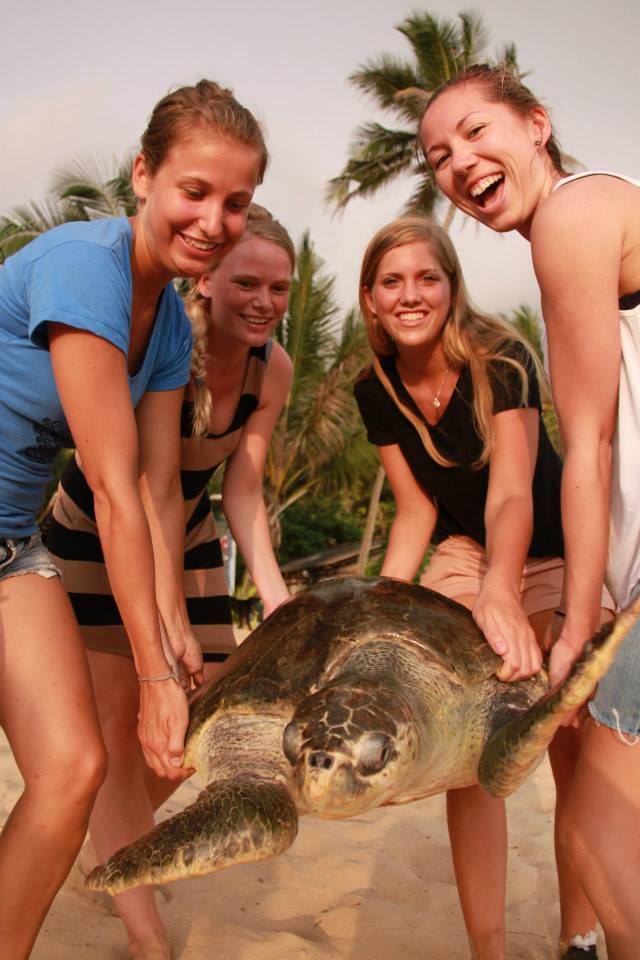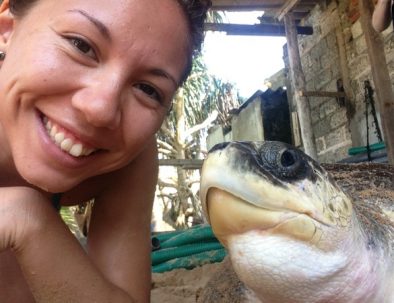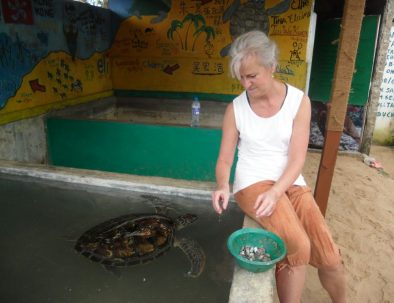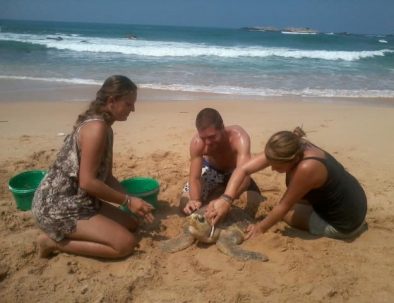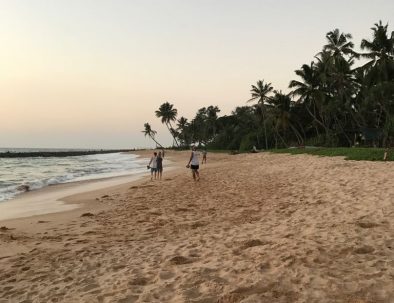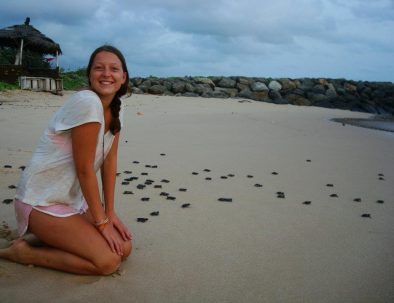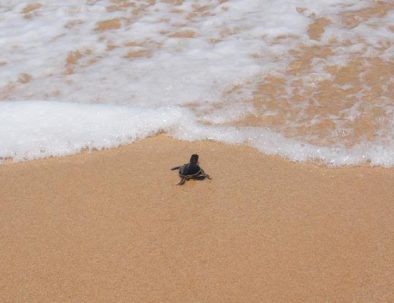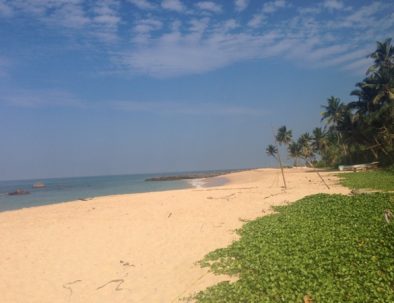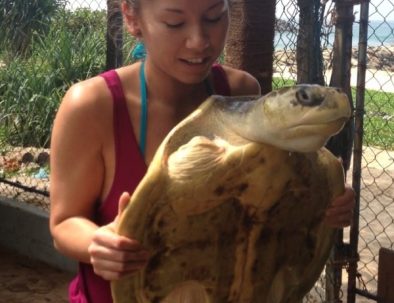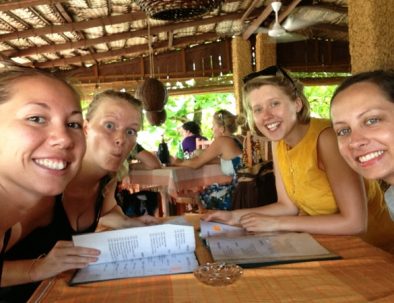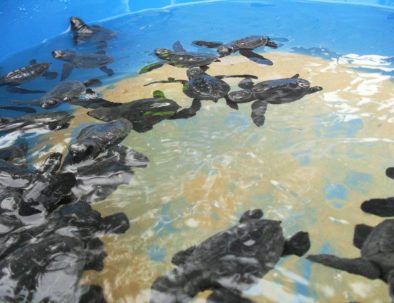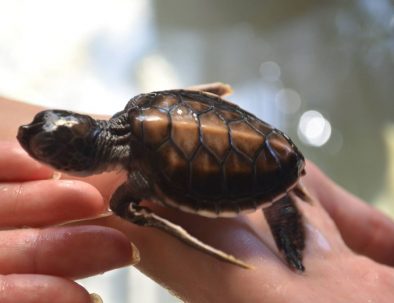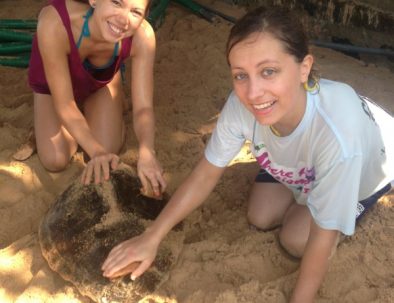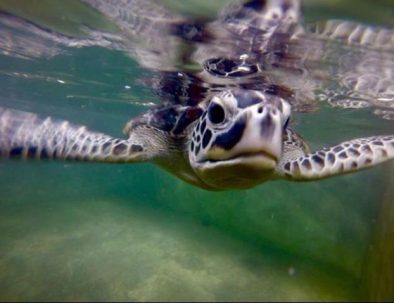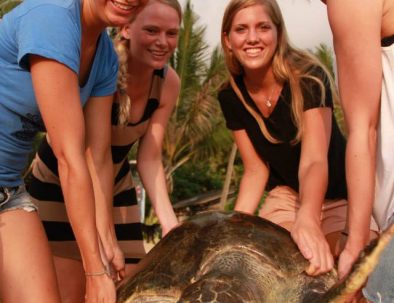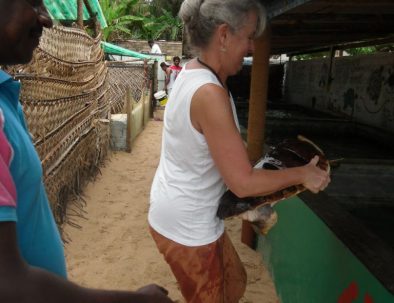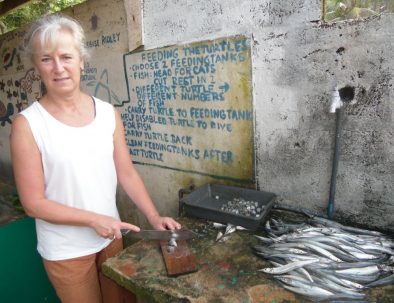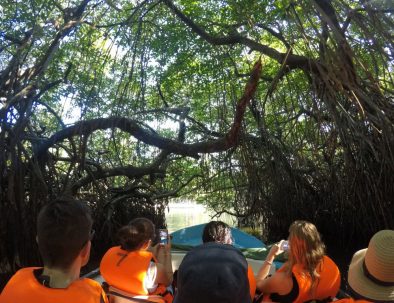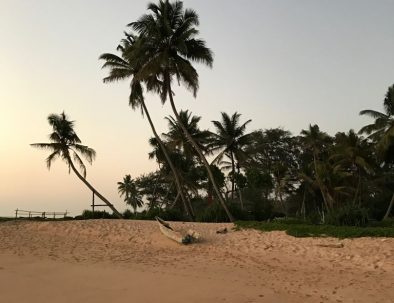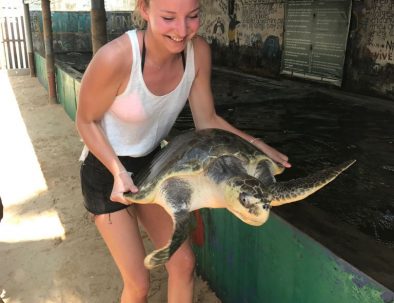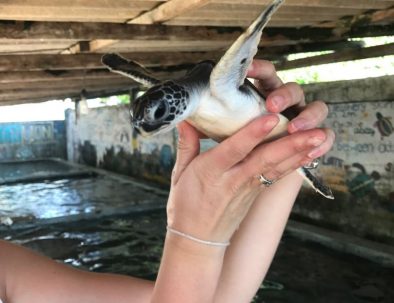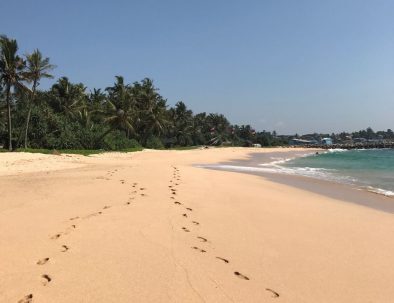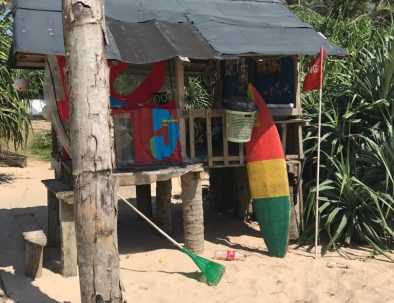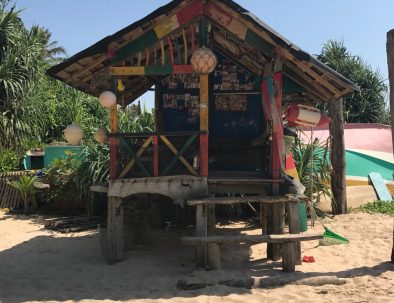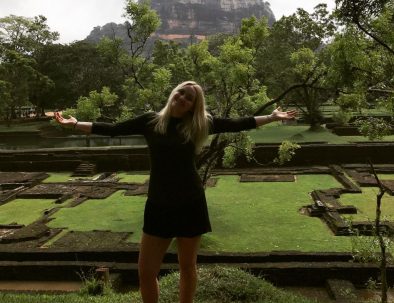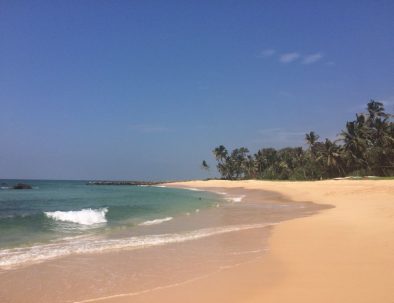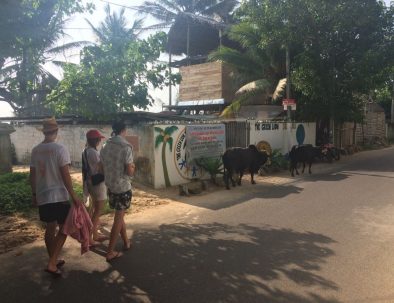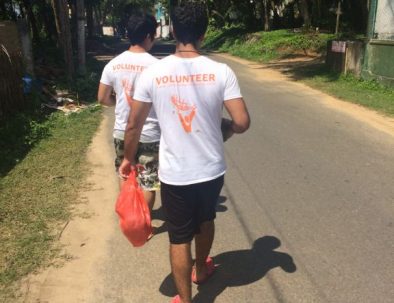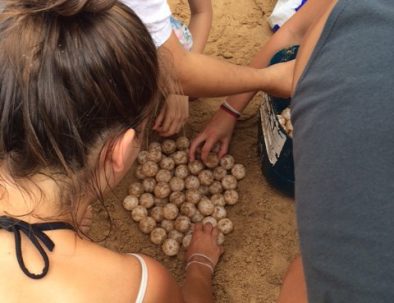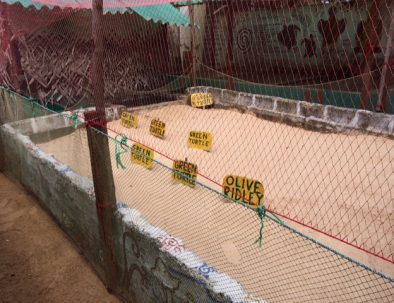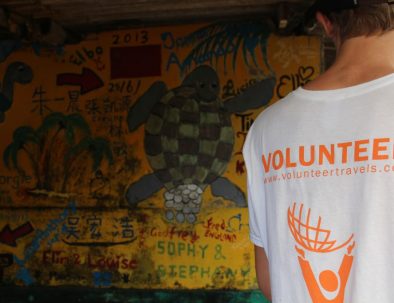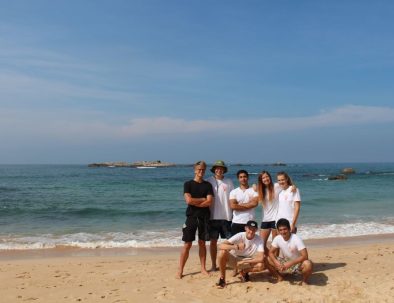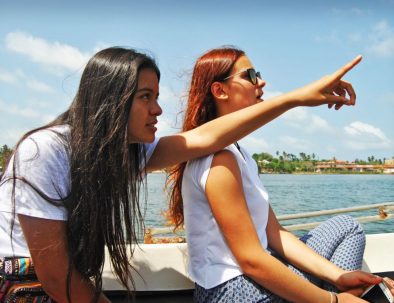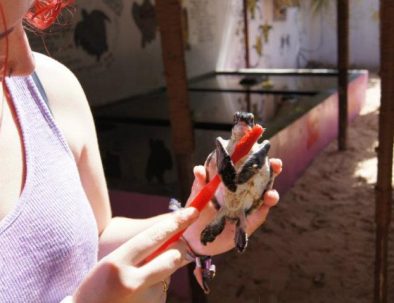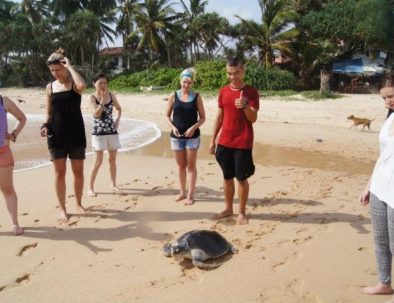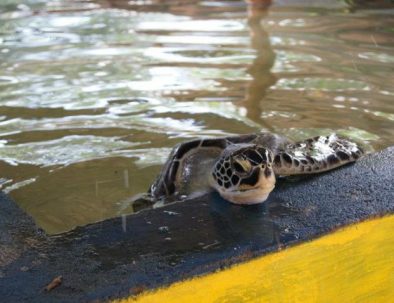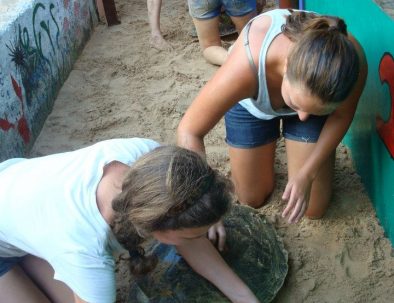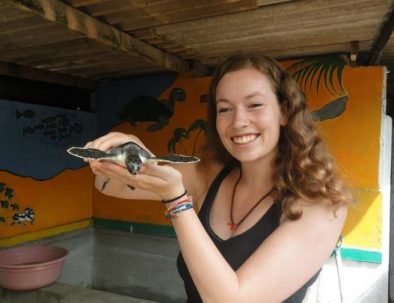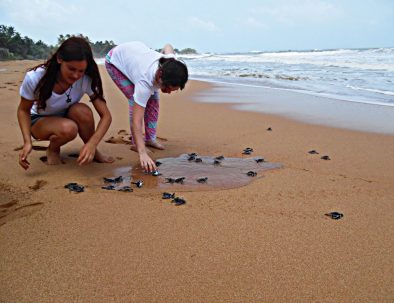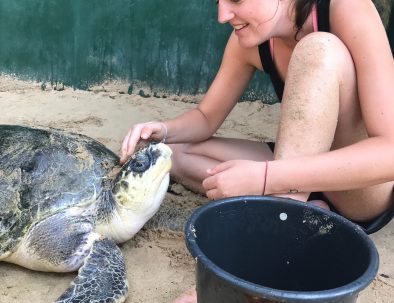In Sri Lanka’s south-western tip, you will find coastal towns with powdery white sand lying on the edge of the Bay of Bengal, the largest bay in the world. Many of the villages along the coast are reliant on fishing as their main source of income and food. Fishing in these parts often results in sea turtles getting caught in the nets and loosing fins. This conservation project works towards protecting all stages of a turtle’s life, from egg to adult. It also works towards providing alternative income for fisherman or people who rely on poaching sea turtle eggs. This project works out of a number of different towns along the coastline.
Project fee from EUR 1,070
Your Role as a Volunteer
As a volunteer at the Sea Turtle Conservation it will be you main task to take care of the injured turtles. As most of the injured turtles have been caught in nets, the majority of the injuries are lost fins; however there are other injuries as well. If the turtles have lost their fins, obviously it is difficult to rehabilitate them therefore quality care is priority for these turtles to give them a good life. There are five species of turtles found on the coast of Sri Lanka these include Green Turtles, Olive Ridley Turtles, Leatherback Turtles, Hawksbill Turtles and Loggerhead Turtles – three of which are critically endangered. Turtles use the beach to lay their eggs, which as a volunteer you will need to protect, which often proves quite a challenge.
Some of your duties as a volunteer might include the following:
- Feeding the turtles
- Nurturing and assisting with release of baby turtles
- Protect and monitor turtle eggs
- Cleaning of water tanks
- Assist with turtle releases
- Beach clean ups
- Learning and teaching more about marine conservation in the villages surrounding the projects
Schedule
As a volunteer you will work from Monday to Friday on the project leaving the weekend free to travel and explore Sri Lanka. Work days run from 9am to 3pm.
Public holidays for 2018
(The projekt is closed during this time and there will be other activities for volunteers)
January 1st – Full Moon Poya Day
January 31st -Full Moon Poya Day
February 14th – Maha Siva Rathri
Marsh 1st – Full Moon Poya Day
Marsh 30 – Good Friday
April 9-14th – Sinhala and Tamil New Year
May 1st – International Workers Day
May 29-30 – Vesak Full Moon Poya Day
June 15th – Ramazan Festival
June 27th – Full Moon Poya Day
July 27th – Full Moon Poya Day
August 21st – Haji Festival
September 24th – Full Moon Poya Day
October 24th – Full Moon Poya Day
November 6 – Deepvali Festival
November 21 – Milad-un-Nubi Festival
November 22 – Full Moon Poya Day
December 25th -Christmas
The Project’s Mission
The project aims to protect turtles from egg to adult, anyway possible. This project protects the beaches, as well as looks after injured turtles.
Partners
These projects are all run in collaboration with a local partner who has extensive experience with hosting volunteers. Thanks to this cooperation, Volunteer Travels can offer its volunteers a well-organized and safe experience for their volunteers.
How do I book a trip?
You can book your trip with Volunteer Travels by calling us on (+46) 08-23 93 00 or by booking through our website www.volunteertravels.com by clicking on “Book a trip”. You can also email us on [email protected]. When you have registered yourself we will send you an invoice with a registration fee of €150.00. The registration fee is later incorporated into the trip price and the amount is then deducted from your final invoice. When you have paid the registration fee you are formally registered. You will then receive preparatory information from us in good time to plan your trip.
Your Everyday
Orientation
On arrival in Sri Lanka’s capital, Colombo you will be greeted at the airport by someone from the partner organisation. From here you will travel 90km to Ambalangoda, where the main project is located. During your first week, you will receive more detailed information about the goals, objectives and methods of the project.
Accommodation and Food
You will be accommodated in their center which is located a few meters from the ocean. Their rooms allocate 4-6 people based on a single-gender basis and shared toilet with your roommates.
The beach is located closer to the accommodation where you can hang out with fellow participants.
Furthermore, there is a refrigerator which you are welcome to use to store food and beverages. Safety lockers are available to store your belongings. Please bring your own padlock to be used.
You will be provided with three meals a day on weekdays and two meals per day on weekends. The meals are mainly Sri Lankan food, consisting mainly of vegetarian dishes including rice and vegetables. You can eat out at any of the local restaurants.
The house is located 10 minutes walk away from the city center, where you can find anything you might need.
The nearest ATM and supermarket are located a 10 minute walk away from their accommodation.
Leisure
When you are not working, you will be free to explore your surroundings. There are no activities scheduled outside of their programs.
Ambalangoda is situated on a beautiful sandy beach, so swimming in the ocean is of course the favourite pass time for most visitors. This coastal town is well known for its devil masks and devil dancers, boasting great cultural experiences. Lively fish markets are spread around the town and are always interesting places to visit. This area was unfortunately hit hard by the 2004 tsunami, which is visible through the numerous memorials situated around the town.
Visit Sailatalarama Vihara which lies 7km inland from Ambalangoda. This temple sits on a domed hill with broad views over spice plantations and lakes towards the ranges of the Province of Sabaragamuwa. The temple has a 35m-long sleeping Buddha statue, built by donations. Pilgrims approach the dagobas and devale (a complex designed for worshipping a Hindu or local Sri Lankan deity) via 208 steps, but there’s also a road to the top.
Also visit The Ariyapala Mask Museum, with its dioramas and explanations in English, gives an excellent insight into Sri Lankan masks and the meanings behind them. It also sells the booklet The Ambalangoda Mask Museum, a useful publication if you want to delve into the mysterious world of dance, legend and exorcism, and the psychology behind the masks.
About Sri Lanka
Sri Lanka or Ceylon is an island nation situated just south of India on the Indian Ocean. Sri Lanka is also called the pearl of the Indian Ocean and is one of the world’s largest tea producers. Emerald green tropical forests, aqua blue seas and white sparkling beaches are just some of the things that Sri Lanka is known for. This beautiful landscape together with the rich and colourful culture and culinary characteristics make Sri Lanka a great country to visit.
The Portuguese discovered the country in the 1500’s, colonizing the island. The British took over in the 1700’s until 1948, where it became an independent state. During the first decade as a free nation, tensions increased between the country’s two main ethnic groups: the Sinhalese and the Tamil. In 1972, the country became a republic under the name of Sri Lanka. After continued clashes between the two ethnic groups, war ended in 2009 where the Tamil were defeated. Since then the situation has returned to being peaceful, with most of the refugees returning home and the country was able to become prosperous again.
Climate
Sri Lanka’s climate is tropical and warm. The average temperature ranges between 28˚C to 31˚C. In January, when it is colder you might even be able to wear a jacket. The rainy season lasts from April to June and then October to November. The monsoon season affects the south-western part of the country between May and September.
Practical
Flight
Your flight ticket is not included in the tour price. Once you have booked your trip with us, you will receive flight options from a partner travel agent. If you wish to continue the flight booking with them, feel free, otherwise you will have to look into getting your own flights. You will need to book your ticket so that you arrive in Colombo the Sunday before your time at the project starts. Your last day will be on a Friday, so if you wish to return home immediately, we suggest you book your return flight for the Saturday. Of course, you are free to arrive early or stay later to do some more traveling. Be sure that your arrival and departure dates coincide correctly with your time at the project.
Visas
It is the volunteers responsibility to acquire the right visa for the trip. Different visa rules may apply depending on your nationality. Visit the embassy web page of your destination to find out what the visa terms are between your country and that destination.
Insurance
You are responsible for your own insurance which should cover you for illness, injury and theft while working as a volunteer. Majority of travel agencies sell travel insurance which you can buy as a supplement to your home insurance. Included in your tour price is a liability insurance, which Volunteer Travels provides in case you unintentionally injure someone or damage someone else’s property while volunteering.
Vaccinations
Please consult your general doctor or local vaccination centre to find out what vaccinations you need for traveling to Sri Lanka. Volunteer Travels always recommends that volunteers get both Hepatitis A and B and tetanus regardless of destination. Please also find out more about communicable diseases and any other epidemics that you might be at risk for.

